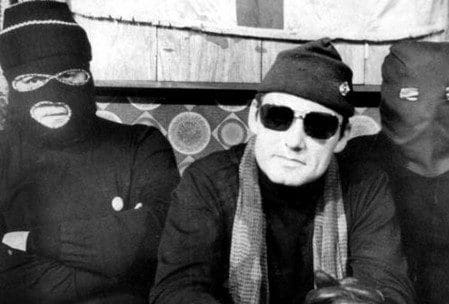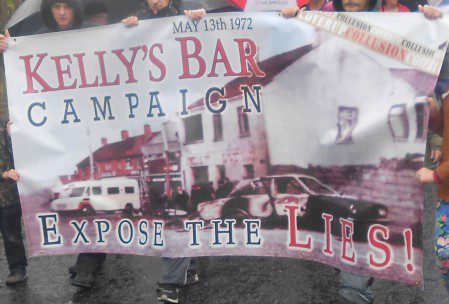Investigative journalist and author, Ian Cobain, has led the way in uncovering the lengths to which the British state will go to bury evidence of its human rights abuses and dirty secrets in books such as Cruel Britannia and The History Thieves.
Most recently in the Guardian, he informed us that the British Government admits “losing” thousands of papers from the National Archives, London. Files relating to the security situation in the north of Ireland in the early 1970s are among files that the National Archives have listed as “misplaced while on loan to government department”. Other files included those relating to the Falklands conflict and the infamous Zinoviev letter, a document forged by MI6 agents to influence voters prior to the 1924 British General Election (which the Conservative Party thereafter won by a landslide). History stolen… evidence destroyed.
The McGurk’s Bar families have not only suffered due to the Britain’s’ file closure of key evidence for over 80 years; we also have experienced the unexplained disappearance of evidence from National Archive files.
Just last year, we successfully petitioned an Information Tribunal in London for the release of parts of a closed file which related to the murder of my grandmother and 14 other civilians in the McGurk’s Bar Massacre of 4th December 1971. This followed a 3-year Freedom of Information battle against the National Archives, the Information Commissioner’s Office and the British Ministry of Defence which were forced to release vital information which controverted the lies of the Royal Ulster Constabulary and the state.
Despite a mountain of evidence, including a witness who saw the bombers plant the bomb, the police and state blamed the victims for the bombing and said that it was an “IRA own-goal”. After 45 years, we proved conclusively that a British bomb expert informed British Army Headquarters and the police that McGurk’s Bar had been attacked and the victims were innocent.
British State Agents
There were a number of disturbing facts that arose from this tribunal – the majority of which was heard in secret and away from me and my legal counsel. Firstly, the barrister for the British Ministry of Defence was forced to admit that we were being denied access to other evidence in this file which related directly to the mass-murder of our loved ones. The evidence was being withheld for two reasons:
- National Security
- Protection of an agent/informerBritish State Agents
The admission that a state agent/informer was related in some way to the McGurk’s Bar bombing was horrific enough but the British Ministry of Defence and the National Archives had to also admit to the judge that key documents which we expected to find in the file and which should have been there had inexplicably “disappeared”.
Missing Files
This included Sheet 3 of a chronological log of the Commander’s Diary which covered a critical period in the aftermath of the massacre. Sheet 2 was there, so was Sheet 4, but Sheet 3 was gone. This sheet could have held information relating to the witnesses (whom the RUC ignored); information from state agents (as in a few sheets later); and evidence that the police and army had discovered the car which the bombers had abandoned a few streets away. We now know that the police did discover it – a record in an RUC fingerprint ledger proved that the police had indeed found the car and examined it and this examination yielded two partial prints but all of this evidence disappeared from the police investigation and were not made public.
Also missing was a critical Situation Report (SITREP) for the day of the bombing 4-5th December 1971. SITREPs were a daily report from each British Army Brigade area which recorded key information and events each day. I expected that the missing SITREP would have included critical evidence relating to the bombing and its aftermath such as British Army and Special Force deployment, Information Policy and intelligence relating to the Loyalist culprits.
Every other SITREP for each day of December 1971 was there but not this crucial one relating to the mass-murder of men, women and children in McGurk’s Bar, an attack which at that time was the single greatest loss of civilian life in any murderous attack since the Nazi blitz of Belfast a generation before.
Again, neither the British Ministry of Defence nor the National Archives could not explain the disappearance of these crucial documents from the file. The British judge only adjudicated on what he had sight of in front of him, so he recorded:
“the Tribunal is satisfied that where there are apparent gaps in the information provided this is because the information was not in the file as it was transferred to TNA [the National Archives] and not because it was subsequently weeded out. The response to the information request can only relate to the information held and – where for whatever reason – information is not there as a logical progression (as with an apparently missing Serial) it should not be presumed that it has been deliberately extracted before being delivered to TNA.” (Serial 85, page 23 of Judgement).
So the critical files are not there as can be expected but we do not know who took them, when they took them or why; but the British judge tells us we cannot assume that these crucial articles of evidence were taken deliberately before being given to the National Archives.
This is what families like ours have to face in court when we discover closed files which should have been accessed by police investigators; when we fight against the British state for access to closed files and win; but then learn that crucial evidence within those files have disappeared. Nobody will admit who stole them, but history and the truth are potentially lost forever.
It’s Britain’s History Thieves at their work again.
Further Information
Download the historic judgement which is now being used as precedent by families accessing information buried in British archives.
Read the North Belfast News article by Conor McParland: McGurk’s Victims’ Campaigner Angered Over “Lost” Documents



